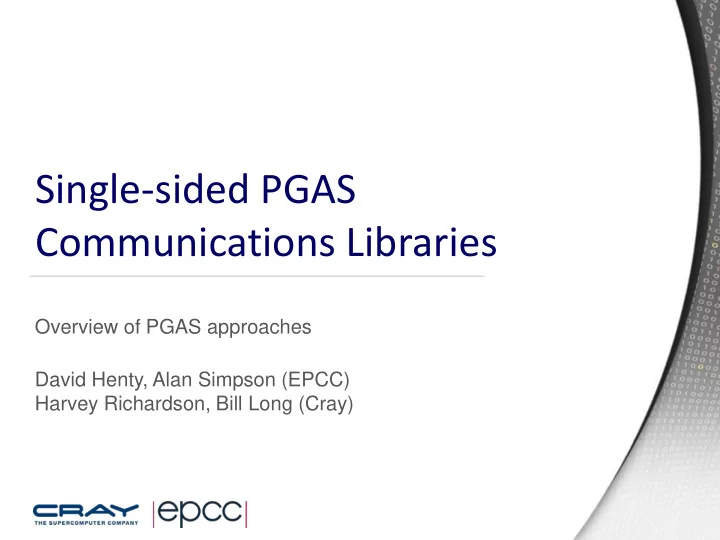

Single-sided PGAS Communications Libraries Overview of PGAS approaches David Henty, Alan Simpson (EPCC) Harvey Richardson, Bill Long (Cray)
Shared-memory directives and OpenMP memory threads 2
OpenMP: work distribution memory !$OMP PARALLEL DO do i=1,32 a(i)=a(i)*2 end do 1-8 9-16 17-24 25-32 threads 3
OpenMP implementation memory process threads cpus 4
Shared Memory Directives • Multiple threads share global memory • Most common variant: OpenMP • Program loop iterations distributed to threads, more recent task features Each thread has a means to refer to private objects within a parallel context • Terminology Thread, thread team • Implementation Threads map to user threads running on one SMP node Extensions to distributed memory not so successful • OpenMP is a good model to use within a node 5
Cooperating Processes Models PROBLEM processes 6
Message Passing, MPI process memory memory memory cpu cpu cpu 7
MPI process 0 process 1 memory memory cpu cpu MPI_Send(a,...,1,…) MPI_Recv(b,..., 0,…) 8
Message Passing • Participating processes communicate using a message-passing API • Remote data can only be communicated (sent or received) via the API • MPI (the Message Passing Interface) is the standard • Implementation: MPI processes map to processes within one SMP node or across multiple networked nodes • API provides process numbering, point-to-point and collective messaging operations • Mostly used in two-sided way, each endpoint coordinates in sending and receiving 9
SHMEM process 0 process 1 memory memory cpu cpu shmem_put (a, b, 1, …) 10
SHMEM • Participating processes communicate using an API • Fundamental operations are based on one-sided PUT and GET • Need to use symmetric memory locations • Remote side of communication does not participate • Can test for completion • Barriers and collectives • Popular on Cray and SGI hardware, also Blue Gene version • To make sense needs hardware support for low-latency RDMA- type operations 11
Fortran 2008 coarray model • Example of a Partitioned Global Address Space (PGAS) model • Set of participating processes like MPI • Participating processes have access to local memory via standard program mechanisms • Access to remote memory is directly supported by the language 12
Fortran coarray model process process process memory memory memory cpu cpu cpu 13
Fortran coarray model process process process memory memory memory cpu cpu cpu a = b[3] 14
Fortran coarrays • Remote access is a full feature of the language: Type checking Opportunity to optimize communication • No penalty for local memory access • Single-sided programming model more natural for some algorithms and a good match for modern networks with RDMA 15
High Performance Fortran (HPF) • Data Parallel programming model • Single thread of control • Arrays can be distributed and operated on in parallel • Loosely synchronous • Parallelism mainly from Fortran 90 array syntax, FORALL and intrinsics. • This model popular on SIMD hardware (AMT DAP, Connection Machines) but extended to clusters where control thread is replicated 16
HPF memory memory memory memory pe pe pe pe memory cpu 17
HPF memory memory memory memory pe pe pe pe memory A(N) - distributed A(1:N)=SQRT(A(1:N)) cpu 18
UPC thread thread thread memory memory memory cpu cpu cpu 19
UPC thread thread thread memory memory memory cpu cpu cpu upc_forall(i=0;i<32;i++; affinity ){ a[i]=a[i]*2; } 20
UPC • Extension to ISO C99 • Participating “ threads ” • New shared data structures shared pointers to distributed data (block or cyclic) pointers to shared data local to a thread Synchronization • Language constructs to divide up work on shared data upc_forall() to distribute iterations of for() loop • Extensions for collectives • Both commercial and open source compilers available Cray, HP, IBM Berkeley UPC (from LBL), GCC UPC 21
Recommend
More recommend